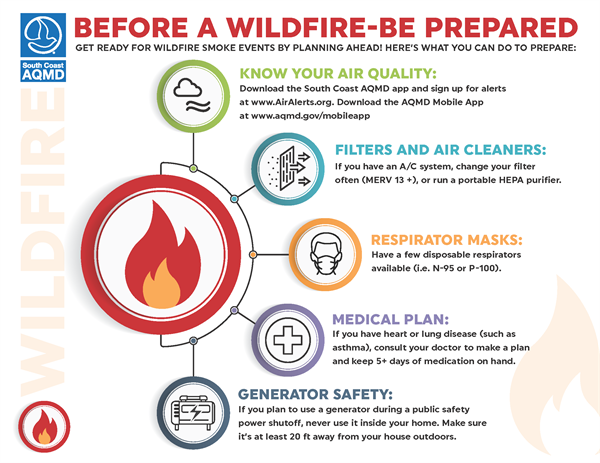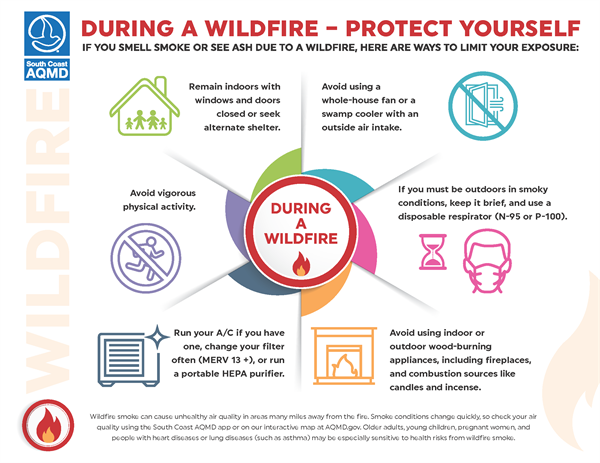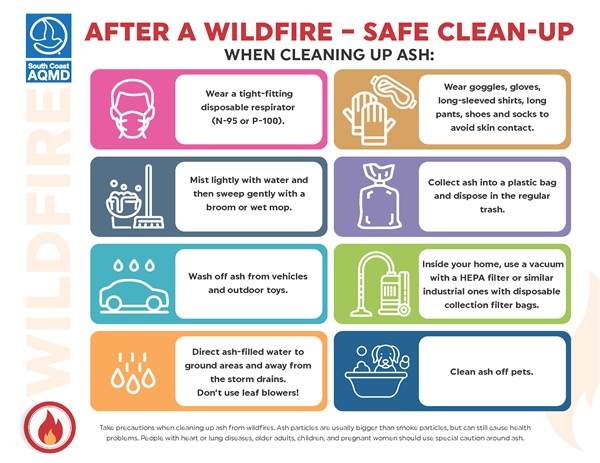Wildfire Smoke and Ash Health Safety Tips
Wildfires can often cause very high air pollution levels that are harmful to your health. Protect your health by taking steps Before, During, and After a wildfire to reduce how much pollution you are breathing.
Before a Wildfire Smoke Event – Be Prepared

(Graphic in Spanish) Antes De Un Incendio Forestal – Prepárese 
Get ready for wildfire smoke events by planning ahead! Here’s what you can do to prepare:
 (Graphic in Spanish) Cómo usar correctamente la mascarilla N95
(Graphic in Spanish) Cómo usar correctamente la mascarilla N95
(Graphic in Armenian)
(Graphic in Chinese)
(Graphic in Farsi)
(Graphic in Korean)
(Graphic in Tagalog)
-
Medical plan: If you or your family member has a heart or lung disease (such as asthma), consult your doctor to have a plan in case the smoke worsens the symptoms. Have an adequate supply of medications on hand (5 days or more).
-
Generator Safety: If you plan to use a generator during a public safety power shutoff, never use it inside your house. Generators produce toxic carbon monoxide gas that can kill you. Only use your generator when it is outdoors and at least 20 feet away from your home. Ensure that you have working carbon monoxide detectors near every sleeping area in your home.
-
Schools and Commercial Buildings: Prepare for wildfires using guidance available at https://www.epa.gov/emergencies-iaq/wildfires-and-indoor-air-quality-schools-and-commercial-buildings .
.
-
Schools and Families: Follow guidance from the California Department of Education available at: https://www.cde.ca.gov/ls/ep/documents/schlairqualityguide.pdf .
.
During a Wildfire - Protect Yourself

(Graphic in Spanish) Durante Un Incendio Forestal – Protéjase
(Graphic in Armenian)
(Graphic in Chinese)
(Graphic in Farsi)
(Graphic in Korean)
(Graphic in Tagalog)
Wildfire smoke can cause unhealthy air quality in areas many miles away from the fire. Smoke conditions change quickly, so check your air quality using the South Coast AQMD app or on our interactive map
or on our interactive map . Older adults, young children, pregnant women, and people with heart diseases or lung diseases (such as asthma) may be especially sensitive to health risks from wildfire smoke.
. Older adults, young children, pregnant women, and people with heart diseases or lung diseases (such as asthma) may be especially sensitive to health risks from wildfire smoke.
If you smell smoke, see smoke near ground level, or see ash due to a wildfire, here are ways to limit your exposure:

(Graphic in Spanish) Durante los incendios forestales cuándo tomar precauciones
(Graphic in Armenian)
(Graphic in Chinese)
(Graphic in Farsi)
(Graphic in Korean)
(Graphic in Tagalog)

(Graphic in Spanish) Cenizas durante un incendio forestal
(Graphic in Armenian)
(Graphic in Chinese)
(Graphic in Farsi)
(Graphic in Korean)
(Graphic in Tagalog)

(Graphic in Spanish) Mantenga un espacio limpio durante un incendio forestal
-
Remain indoors with windows and doors closed or seek alternate shelter.
-
Avoid vigorous physical activity.
-
Run your air conditioner if you have one and make sure it has a clean filter. Close the fresh air intake if your air conditioner has the option so that it is recirculating the indoor air to prevent bringing additional smoke inside. A higher efficiency filter (i.e. higher MERV rating) will filter out more smoke particles than a low efficiency one.
-
Create a space in your home with filtered air, by using a portable high-efficiency or HEPA air cleaner while keeping doors and windows closed. This can be a room where you spend a lot of time, such as a bedroom. More information about air filters and air cleaners can be found here: Fact Sheet on Indoor Air Filtration.
-
If you can stay cool without them, avoid using a whole-house fan or a swamp cooler with an outside air intake.
-
Avoid using indoor or outdoor wood-burning appliances, including fireplaces. Avoid combustion sources inside the home such as candles and incense that could further degrade indoor air quality.
-
If you must be outdoors in smoky conditions, keep it brief, and use a disposable respirator (N-95 or P-100). These respirators can offer some protection from smoke particles if they are worn properly and have a tight fit. Do not rely on surgical masks or cloth masks for protection. Information about using respirators to protect from wildfire smoke or ash can be found here: Fact Sheet on Respirators
-
Commercial building managers should follow their Smoke Readiness Plan. Guidance on developing a plan can be found here: https://www.epa.gov/emergencies-iaq/wildfires-and-indoor-air-quality-schools-and-commercial-buildings .
.
After a Wildfire - Safe Clean-up

(Graphic in Spanish)Después De Un Incendio Forestal – Limpie Con Precaución
(Graphic in Armenian)
(Graphic in Chinese)
(Graphic in Farsi)
(Graphic in Korean)
(Graphic in Tagalog)
Take precautions when cleaning up ash from wildfires. Ash particles are usually bigger than smoke particles, but can still cause health problems. People with heart or lung diseases, older adults, children, and pregnant women should use special caution around ash.
When cleaning up ash:
-
Wear a tight-fitting disposable respirator  (such as a N-95 or P-100 respirator mask) to protect your lungs.
(such as a N-95 or P-100 respirator mask) to protect your lungs.
-
Wear goggles, gloves, long-sleeved shirts, long pants, shoes and socks to avoid skin contact.
-
Mist lightly with water and then sweep gently with a broom or wet mop. Direct ash-filled water to ground areas and away from the storm drains. Don't use leaf blowers!
-
Collect ash into a plastic bag and dispose in the regular trash.
-
Inside your home, use a vacuum with a HEPA filter or, if possible, similar industrial ones with disposable collection filter bags. Misting lightly with water and then sweeping gently with a broom is another option.
-
Take your car to the car wash.
-
Wash off toys.
-
Clean ash off pets.
Additional Resources
For everyone:
For schools:
For emergency generator operators: